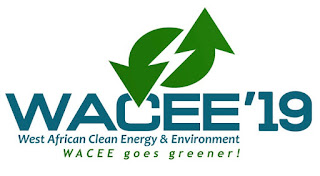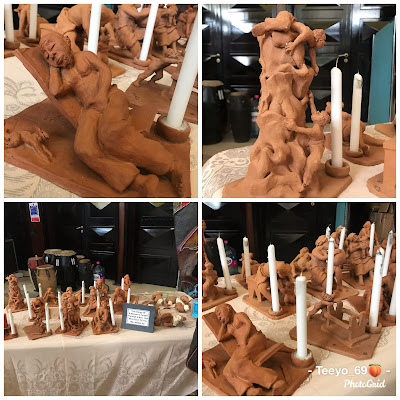WACEE
WEST AFRICAN CLEAN ENERGY AND ENVIRONMENT TRADE FAIR AND CONFERENCE 2019 (WACEE19)
Friday 8th of November, 2019 was the last day of the WACEE seminar held at the Accra International Conference Center. The seminar started around 8:30 am and ended around 12:30. Upon my arrival around 10:00 am, there was a registration point where I had to input my personal information so that a tag can be created for me before I could attend the seminar. The places was full of activities. There were various seminars going on, people exhibiting their works, and also photographers documenting the ongoing activities.
I made my way upstairs and attended a seminar on Water Waste Management with two of my colleagues. Wastewater treatment is a process used to remove contaminants from wastewater or sewage and convert it into an effluent that can be returned to the water cycle with minimum impact on the environment, or directly reused. The latter is called water reclamation because treated wastewater can be used for other purposes. The treatment process takes place in a wastewater treatment plant (WWTP), often referred to as a Water Resource Recovery Facility (WRRF) or a Sewage Treatment Plant(STP). Pollutants in municipal wastewater (households and small industries) are removed or broken down.
The treatment of wastewater is part of the overarching field of sanitation. Sanitation also includes the management of human waste and solid waste as well as storm water (drainage) management.By-products from wastewater treatment plants, such as screenings, grit and sewage sludge may also be treated in a wastewater treatment plant.
We were later asked to group ourselves for further discussion and research and to also use what we’ve learnt to help any town of our choice with water waste management. I was appointed to write down our points to help us build the whole concept on a lager paper.
When the seminar ended, I went downstairs to see other exhibitor’s stand and ask them a few questions on what they were exhibiting. The first stand I went to was Sani Amanzi. They specialize in water purification for the less privileged with the aid of sanitizing solution. Miss Iye Hassan the regional manager of the West African branch, took my colleagues and I through the purification process;
The sanitizing solution is in a small sachet which is poured into impure water. The water is then stirred for 10 minutes and then left to settle for 30 minutes. After 30 minutes, the impurities float on top of the water. The water is then filtered with clean napkins the to get rid of the dirt and leaving the purified water behind.
The next exhibition stand I went to was Jwhonjovouchor ( Voice of Waste ). They specialize in making masks with waste such as plastic, paper, metal etc. They also make miniature sculpture pieces which tells a story and is also a candle stand. A quote I found on their stand caught my attention and it read; “ THE ENERGY OF A WOMAN IS FOUGHT THROUGH A MAN, SHE MUST PUSH TILL THE MAN WAKES UP.”
My next stop was the photo booth. It was built with ply wood and decorated with bottle covers, plastic bottles, gallons, paper etc. My colleagues and I decided to take pictures in the photo booth.
The next stand was Jekora Ventures. They are leading in the market of waste management in Ghana, a fully Ghanaian-owned company delivering the fastest and greenest of service.
Their mission is to deliver operationally efficient, cost effective and affordable services and products, Through application of appropriate technology and innovation, to our cherished clients, By creating wealth through resource recovery And promoting a sustainable environment. And their vision is to be the leading integrated waste management and resource recovery company Improving Ghana’s environment and public health. They also use the manure from the waste they have collected to grow coconut, maize etc.
I later stopped by Plastic Punch stand. They an NGO raising awareness on the dangers of plastics for the environment, humans and marine life as well as finding sustainable waste management solutions. They also organize beach clean ups to remove dirt from the sea to save the marine life especially turtles. We were asked to fill some forms on how often we use plastic materials.
Finally I ended up with at the board game stand (the loop), where my make colleagues were participating in. I sat down to watch them play whiles they explained the game to me as they played.
The WACEE seminar was really educative and fun as well. The seminar was planned in a way you can decide which seminar you what to attend and had a lot of exhibition stands where we could learn a lot from and also know more NGO’s and companies in Ghana who are focusing on waste management. I also noticed they used a lot of paper, they limited the use and plastics.


















Comments
Post a Comment